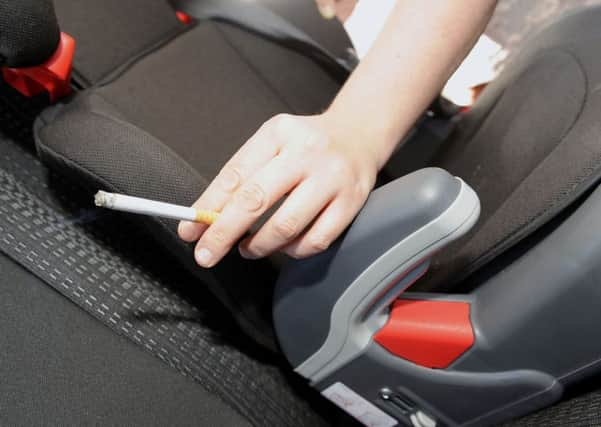Police concerns over enforcing car smoking ban


In a submission to the Scottish Parliament’s health committee, Police Scotland said it supported the proposed legislation, but said policing the ban did not “sit comfortably” with the force’s priorities.
Under the proposed Smoking Prohibition (Children in Motor Vehicles) (Scotland) Bill, smokers would be given a £100 fixed penalty notice if found to be lighting up while a child was present.
Advertisement
Hide AdAdvertisement
Hide AdAccording to the bill, those with the power to hand out fines will be police officers who have “reason to believe” that a person is committing or has committed the offence.
The police’s submission said: “The bill proposes that the police will be the sole enforcement authority and it is suggested that this needs to be carefully considered.
“As a public health issue is it proportionate or necessary to justify the use of limited police resources to enforce it? The proposed legislation will only have an impact on public health and, whilst commendable, does not sit comfortably within the Police Scotland policing plan and the force priorities.
“Police Scotland would therefore question the use of police resources to enforce this legislation and their diversion from work focusing on the force priorities such as organised crime and counter-terrorism, for example. The work of road policing officers in particular is focused on reducing road casualties and tackling road crime and whilst this is a broad remit, there is little if any room for matters of public health.”
Tory transport spokesman Alex Johnstone said the police’s concerns showed it would be “nigh on impossible” to enforce the legislation.
He said: “Officers are telling MSPs that bringing this into law could hamper tackling organised crime and terrorism.
“That’s quite a stark warning by anyone’s standards.
“With the force’s limited resources, we really need officers to be concentrating on more important matters.”
In its submission on the bill, the Law Society of Scotland called for drivers, not necessarily the smokers themselves, to be held liable under the legislation. It also said the law would be “difficult to enforce”.
Advertisement
Hide AdAdvertisement
Hide AdAlison Britton, convener of the Law Society’s health and medical law committee, said: “Of course we support the policy intent behind this bill, and the harmful effects of smoking and second-hand smoke are well documented.
“However, as it stands, the proposed legislation places the criminal liability on the smoker rather than driver of the vehicle.
“It is our view that it would be more logical that the driver bear the responsibility to ensure no one smokes in the car where a child is present, like the legislation that has just been passed in England.”
The bill is being proposed by Liberal Democrat MSP Jim Hume, and has already won the backing of the Scottish
Government.
Mr Hume said: “I am delighted to have Police Scotland’s support for the aims of my bill.
“It chimes with the significant 85 per cent of Scots who have said they would like to see children protected from second-hand smoke whilst in the confines of a car.
“In 2013/14, Police Scotland detected over 36,000 seatbelt offences and just over 34,000 mobile phone offences. This demonstrates that detection is perfectly possible.”